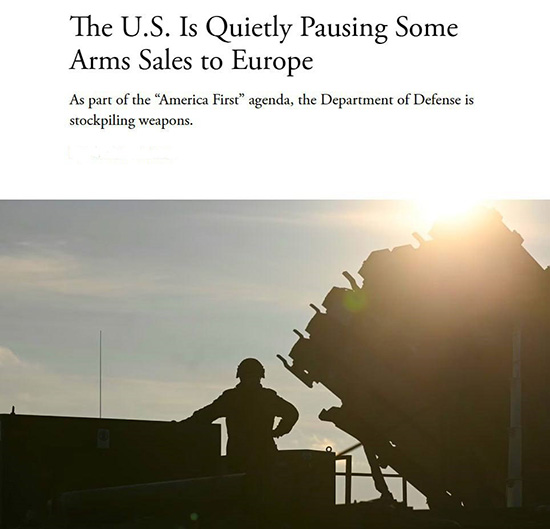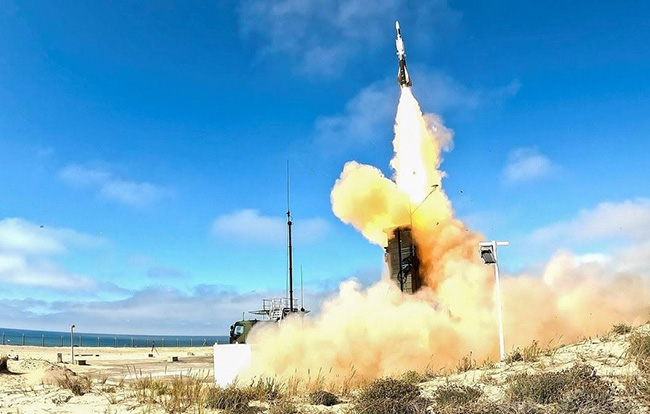
The first clue that something had changed in the U.S. approach to selling military equipment to Europe came as Denmark neared a decision on the purchase of a multibillion-dollar air-defense system. For weeks, American and French negotiators had aggressively pursued the deal. But as the deadline approached, the Pentagon suddenly lost interest, ‘The Atlantic’ notes.
“We couldn’t understand why,” a contractor who had been tracking the discussions told me. “It seemed like a no-brainer, but they just weren’t into it.”
Then, on a call earlier this month with the State Department, Deputy Assistant Secretary of Defense Elbridge Colby said that he didn’t believe in the value of certain foreign military sales, according to two administration officials with knowledge of the discussion. He added that he didn’t like the idea of selling Patriots — which can intercept incoming missiles — to Denmark, because they are in short supply and should be reserved for the United States to use as needed.
The comments surprised some State officials, but they soon learned that it wasn’t just Denmark having its access cut off. Current and former administration officials told me the Pentagon has identified some weapons as being in short supply, and is moving to block new requests for those systems coming in from Europe.
There have been concerns about Patriot shortages for months: The U.S. has only about 25 percent of the missile interceptors needed for the Pentagon’s military plans, according to Defense Department officials. But the Patriot doesn’t really have a European equivalent, which makes it a valuable and highly sought-after system across a continent newly concerned about aerial attacks, a risk driven home today after Reuters reported Russian military jets violated the airspace of Estonia, a NATO member.
If the hold is long-term, it risks creating new rifts with allies, weakening their defenses at a time when Russia poses an imminent threat, and diminishing U.S. military influence across the continent. The change would also mean the loss of billions of dollars of government and private revenue, reducing the number of jobs in the defense industry, limiting product expansion, and curtailing research and development.
Ultimately, Denmark signed a $9.1 billion deal last week to buy long-range air-defense systems made by a joint French-Italian venture, and medium-range systems from Norway, Germany, or France. It was Denmark’s largest-ever purchase of arms. (RTX, the company previously known as Raytheon, which manufactures the Patriot system, didn’t respond to a request for comment.)
Several European nations have sent some of their best weapons to Ukraine to help it defend itself against Russia’s invasion, and in turn they were buying U.S.-made weapons to backfill their stockpiles. Trump has pushed NATO member states to do more to carry the burden of European security. Officials said the latest discussions of a hold on weapons do not include those being sent directly to Ukraine, which are provided through a separate program.
“We tell Europeans we want them to send weapons to Ukraine and buy replacements, but then we say, ‘You can’t have them,’” Mark Cancian, a retired Marine colonel and senior adviser at the Center for Strategic and International Studies, told me. “We also tell them to defend themselves, but then we tell them we won’t sell them the things they need to do that.”
The war in Ukraine has strained stockpiles not only in the U.S. but across Europe, leading to discussions about how better to revitalize the defense industrial base. One of Ukraine’s most requested weapons has been the Patriot, the system Denmark considered buying. Its heavy use in Ukraine’s war against Russia and by Israel in the Middle East has only fueled concerns about the stockpiles, leading to the current hold on exports. This “undermines the security of our European allies,” Cancian said, “but the current administration places a much lower priority on their security than previous administrations.”
Denmark is “potentially changing course”
 Testing of the new Aster 30 missile launched by the French-Italian SAMPT/NG system.
Testing of the new Aster 30 missile launched by the French-Italian SAMPT/NG system.
Photo: Ministry of the Armed Forces of France
Denmark announced that it would acquire eight long- and medium-range air defense systems, for the record sum of 58 billion Danish kroner (7.77 billion euros).
Described as “historic” by the Minister of Defense, this order was particularly surprising due to the choice of suppliers. While Denmark had previously favored the United States for its defense needs, as with the purchase of 27 F-35 fighter jets, this time the country turned to Europe. For the long-range system, the choice fell on the SAMP/T NG (Surface-to-Air Missile System, Next Generation) produced by France and Italy, while for the medium-range systems, the choice will be one or more systems produced by Norway, Germany, and France. And, in a real coup, the SAMP/T NG prevailed over the American Patriot system.
“It is undeniably a turning point, because until now Denmark was the most unwavering ally of the United States in Europe, even ahead of the United Kingdom and Poland, and it purchased almost exclusively American equipment,” Etienne Marcuz, an analyst on strategic weapons, explained to 20 Minutes. “Here, in a major area such as missile defense, it has chosen Europe.”
“It’s a big surprise, and I was among those who thought the Danes would eventually choose the Patriot,” adds Stéphane Audrand, an international risk consultant. “Very clearly, this is a message sent to Washington after the diplomatic crisis between Denmark and the United States over Greenland. While Denmark, the most pro-NATO country in the world, previously bought American equipment without question, it is potentially changing course.
"Technically, Denmark made this choice because it was the right one," explains Stéphane Audrand. "For a very long time, the Patriot was almost the only system that could be certified as 'battle-proven' for intercepting ballistic missiles, a major area in air defense, given that these are particularly difficult missiles to intercept, and fighter jets cannot do it. Basically, it was either Patriot or nothing," he explains. "However, the Danish Navy, by demonstrating that the European Aster missiles could intercept ballistic missiles in the Red Sea, proved that the SAMP/T system could also do it." This also shows that Europe, and particularly France, can compete in the market for major weapons systems, beyond the Rafale.
And, to win contracts, "rather than pushing our partners to buy French products at all costs, it's better to first demonstrate our credibility," adds Etienne Marcuz. "That's what we did with Denmark, by supporting them when the United States was threatening them: we sent an A400M and an MRTT to Greenland, Emmanuel Macron went there... And it paid off."

Pentagon officials sat down with a group of European diplomats in late August and delivered a stern message: The U.S. planned to cut off some security assistance to Latvia, Lithuania and Estonia, all NATO members bordering Russia, Reuters writes.
More broadly, Pentagon official David Baker told the group, according to an official with direct knowledge of the comments, Europe needed to be less dependent on the U.S. Under President Donald Trump, the U.S. military would be shifting its attention to other priorities, like defense of the homeland.
After months of proposing both ideas to solve or intermediate some of the world's most intractable conflicts, Trump has largely withdrawn from diplomacy in recent weeks. Instead, he has allowed and in some cases pressed allies to take the lead, with only distant promises of U.S. help.
He has increasingly turned his attention to domestic issues, like tackling crime, confronting what he calls violent left-wing extremism and overhauling a major visa program.
The president's latest zig could easily be followed by a zag. In April and May, he publicly floated walking away from the war in Ukraine, only to re-engage heavily on the issue.
Further U.S. disengagement "would lead us to more provocative actions from Putin as he sees Europe as weaker because it can be divided - especially without the U.S. there to back it up," said Alex Plitsas, senior fellow at the Atlantic Council.
Several European diplomats in Washington privately expressed exhaustion at Trump's changeable attitude on Russia - and suggested another hardening of his stance toward Moscow could lack credibility.
read more in our Telegram-channel https://t.me/The_International_Affairs

 10:02 22.09.2025 •
10:02 22.09.2025 •






















